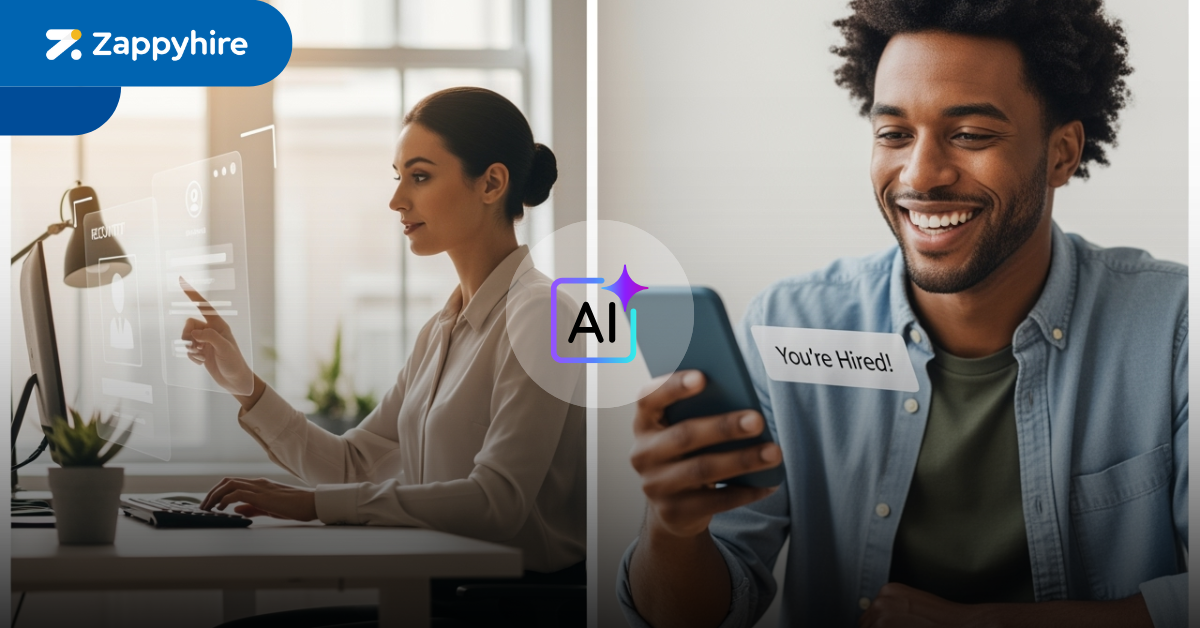
Hiring top talent has always been about finding the right person quickly before your competitor does – and AI interview platforms promise to do just that.
They go beyond simply storing résumés as modern AI platforms analyze video interviews and even schedule meetings. For recruiters and HR leaders at enterprises or even mid‑sized companies, these tools have become essential.
The state of recruitment is changing
Recruiting has become a data‑driven discipline. Surveys of talent leaders show that 51% of talent‑acquisition professionals believe AI improves the quality of their hires, and teams using AI‑assisted messaging are 9% more likely to make a quality hire than those who do not.
Adoption is accelerating because the market for AI in HR is growing fast – analysts project it will rise from about $6 billion in 2024 to almost $7 billion in 2025, a compound annual growth rate of roughly 15.6%.
“Enterprises aren’t asking if they should adopt AI in hiring -they’re asking how fast.”
— Deepu Xavier, Co-founder, Zappyhire
“AI in hiring has crossed the tipping point. For many HR leaders, the conversation is no longer about exploring AI – it’s about implementing it.”
— Samira Dash, Head of HR, Next Education India
With high stakes and increasing complexity, it’s no surprise that HR teams are turning to AI‑based interview platforms to accelerate hiring and improve outcomes.
What is an AI interview platform?
An AI interview platform like Zappyhire combines machine‑learning models, natural‑language processing and video analytics to automate interview scheduling, candidate evaluation and even feedback.
“When we talk about AI in interviews, it’s not just about speed — it’s about giving recruiters richer, more structured insights they can act on.”
— Deepu Xavier
Unlike a basic applicant tracking system (ATS), these platforms also automate administrative tasks, from calendar invitations and reminders to conducting interviews and analyzing candidate responses, freeing recruiters to focus on higher‑value work.
What are the core features of an AI-powered interview platform?
AI-powered interview software deliver a powerful toolkit designed to transform the hiring process. They blend automation of the different stages of the recruitment process, analytics, personalization, and fairness to deliver faster, smarter, and more scalable recruiting.
1. Automated scheduling & ATS integration
AI interview platforms take care of the busywork like scheduling interviews and sending reminders—no endless email chains needed.
They plug directly into your ATS and sync with calendars like Google or Outlook, so recruiters don’t have to juggle multiple tools. This automation speeds up hiring and keeps the process running seamlessly.
“After integration, ideally, if a resignation is recorded in the HRMS, the recruitment platform should automatically start sourcing, engaging, and preparing candidates — so by the time a recruiter logs in, the shortlist is ready.”
— Deepu Xavier
2. Resume parsing & candidate screening
Before interviews even begin, the platform can parse resumes—extracting skills, experience, and qualifications – and automatically match candidates to the right roles.
Screening questions or assessments can be built in, filtering out mismatches early and surfacing the most promising profiles. This ensures recruiters spend their time where it matters: with high-potential candidates.
3. Automated scoring, benchmarking & predictive insights
Candidates get scored based on skills and responses as opposed to gut feel. You can also compare them to benchmarks and past hires.
“Gut feel has its place, but enterprises need decisions backed by data and patterns — not just intuition.”
— Samira Dash
4. Video/voice interviews with behavioral analysis
Recruiters can run both one-way (pre-recorded) and live interviews. The AI listens and observes—picking up on tone, pace, facial expressions, and engagement levels.
This structured behavioral analysis helps assess soft skills like confidence, clarity, and emotional intelligence, making evaluations more consistent and data-driven.
“Soft skills like emotional intelligence, clarity, and cultural fit are critical in enterprise hiring. AI should make assessing them more structured and scalable.”
— Keerthi Krishna Swamy, Digital Transformation Specialist
The system spots patterns in interview data and offers predictions to guide hiring decisions.
5. Natural Language Understanding (NLU)
Instead of just scanning for keywords, the AI understands open-ended answers – summarizing reasoning, sentiment, and key themes.
6. Bias mitigation & fairness
These tools come with built-in features to reduce bias, like anonymized reviews, bias detection, and audit logs.
“Responsible AI means being able to explain why a candidate was shortlisted or rejected — transparency is key to trust.”
— Deepu Xavier
It helps ensure every candidate is assessed fairly.
7. Role‑specific customization & adaptive flow
You can set up different question flows for different roles. The AI interview tool adapts in real time, asking follow-up questions based on what the candidate says.
Templates and rubrics can also be tailored to each role.
8. Multi-language & accent support
AI interview platforms support multiple languages and understand different accents – making interviews inclusive and globally accessible.
“Global hiring means global accessibility — AI must work equally well for diverse accents, languages, and cultural nuances.”
— Keerthi Krishna Swamy
9. Post‑interview analytics & insights
After interviews, you get detailed dashboards – comparing candidates, breaking down question-level performance, and tracking drop-offs or conversions.
10. Candidate experience & branding
You can brand the interview experience with your logo, colors, and even custom AI avatars. This makes the process feel more engaging and aligned with your company culture.
It’s user-friendly for both candidates and recruiters.
How AI interview platforms are helping recruitment teams be more efficient
1. Dramatically reducing time‑to‑hire
“Top candidates leave the market in 15–18 days. Without automation, many enterprises simply can’t move fast enough to secure them.”
— Deepu Xavier
When great candidates don’t stay on the market for long, speed matters. AI-based interview tools help teams screen, schedule, and assess candidates faster, cutting days (sometimes weeks) off the hiring process.

With a rapidly growing network, limited resources, and challenges posed by the pandemic, the Small Finance Bank turned to Zappyhire to automate their recruitment cycle with minimal human intervention.
2. Offering deeper, data‑driven assessments
AI interview software goes beyond time savings by delivering richer insights on each candidate.
From communication style to problem-solving ability, teams get structured insights that go beyond gut feeling.
For example, instead of just noting whether a candidate “seems confident,” the platform can highlight measurable traits like clarity of explanations, logical flow in responses, or adaptability under scenario-based questions.
This makes feedback more actionable and comparisons more objective.
3. Enhancing candidate experience
Far from making recruitment cold and impersonal, well‑designed AI interview platforms can actually improve the candidate experience.
No more back-and-forth emails or confusing interfaces. Candidates also receive timely updates on their interview progress, reminders, and even structured feedback – helping them feel guided, informed, and respected throughout the process.
Some AI interview platforms offer user-friendly, self-guided flows that respect candidates’ time and showcase your company in a polished way.
“AI should enhance the personal touch, not erase it — freeing recruiters to spend more time on high-value conversations.”
— Samira Dash
4. Improving diversity and fairness
AI interview platforms support structured interviews, where every candidate is asked the same set of role-relevant questions and evaluated under the same criterion. This consistency makes the evaluation process fairer by removing subjective variations between interviewers.
Some tools also allow evaluations to be anonymized, meaning personal identifiers like name, gender, or background are hidden during review. This helps recruiters focus only on the quality of responses.
In fact, AI interventions in interviews reduced sentiment-driven bias by 41.2% in a study focusing on early-stage recruitment tools.
“Compliance and fairness aren’t roadblocks — they’re what make scalable hiring possible across regions.”
— Samira Dash
5. Reducing costs and boosting efficiency
Recruiters can handle more candidates without hiring more staff because of the automation of previously manual tasks. This also frees them up to focus on the right candidates sooner, make sharper decisions based on data, and reduce time wasted on mismatches.
That means lower costs and a more scalable process. When recruiters spend less time screening and more time closing the best-fit candidates, the cost-per-hire naturally goes down while the overall quality of hires improves.

With automation in their DNA, Jiffy.ai saw the significant advantages of recruitment automation and sought a system capable of powering their multi-stage interview process.
What are the best practices for adopting AI‑based interview platforms?
AI interview platforms aren’t magic; they are powerful tools that require thoughtful implementation. Here are some considerations for HR leaders looking to adopt or upgrade their AI interview platform.
- Define the problem clearly. Identify hiring bottlenecks (screening, scheduling, drop-offs) and choose AI interview software that targets these pain points instead of generic automation.
- Start with pilot projects. Test the platform on one department or location before scaling.
- Ensure data quality and fairness. Train on diverse data and audit regularly to prevent bias, using methods like red teaming to test for discriminatory outcomes.
- Integrate with your ATS and HRIS. Integration avoids duplication, maintains a single source of truth, and enables tracking of time-to-hire, completion rates, and diversity.
- Provide candidate support. Even top platforms need human assistance – clear instructions, accessible help desks, and personalised feedback boost candidate satisfaction.
- Monitor and iterate. Use analytics dashboards to track key metrics (time‑to‑hire, cost‑per‑hire, completion rates, quality‑of‑hire) and refine your processes continuously.
The key is to treat adoption as a journey
Start small, measure impact, and keep refining. With the right strategy, AI doesn’t just make hiring faster – it makes it fairer, smarter, and more human.






